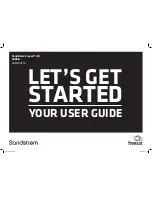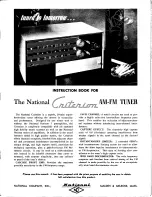
2
Read all the instructions carefully before using the Freesat box
and keep them for future reference.
Retain the manual. If you pass the Freesat box onto a third
party make sure to include this manual.
Check that the voltage marked on the rating label matches
your adapter voltage.
Damage
• Please inspect the Freesat box for damage after unpacking.
• Do not continue to operate the Freesat box if you are in any
doubt about it working normally, or if it is damaged in any
way - switch off, withdraw the mains adapter and consult
your dealer.
Location of Freesat box
• The Freesat box must be placed on a flat stable surface and
should not be subjected to vibrations.
• Do not place the Freesat box on sloped or unstable surfaces
as the Freesat box may fall off or tip over.
• The mains socket must be located near the Freesat box and
should be easily accessible.
• This Freesat box is designed for indoor use only.
Temperature
• Avoid extreme degrees of temperature, either hot or cold.
Place the Freesat box well away from heat sources such as
radiators or gas/electric fires.
• Avoid exposure to direct sunlight and other sources of heat.
Naked Flames
• Never place any type of candle or naked flame on the top of
or near the Freesat box.
Moisture
• To reduce the risk of fire, electric shock or product damage,
do not expose this Freesat box to rain, moisture, dripping
or splashing. No objects filled with liquids, such as vases,
should be placed on the Freesat box.
• If you spill any liquid into the Freesat box, it can cause
serious damage. Switch it off at the mains immediately.
Withdraw the mains adapter and consult your dealer.
Ventilation
• To prevent the risk of electric shock or fire hazard due to
overheating, ensure that curtains and other materials do not
obstruct the ventilation vents.
• Do not install or place this Freesat box in a bookcase, built-in
cabinet or in another confined space. Ensure the Freesat box
is well ventilated.
Safety
• Always disconnect the Freesat box from the mains supply
before connecting/disconnecting other devices or moving
the Freesat box.
• Unplug the Freesat box from the mains during a lightning
storm.
Mains Adapter Cable
• Make sure the Freesat box or Freesat box stand is not resting
on top of the mains cable, as the weight of the Freesat box
may damage the mains cable and create a safety hazard.
• If the mains cable is damaged it must be replaced by the
manufacturer, its service agent, or similarly qualified persons
in order to avoid a hazard.
Interference
• Do not place the Freesat box on or near appliances which
may cause electromagnetic interference. If you do, it may
adversely affect the operating performance of the Freesat
box, and cause a distorted picture or sound.
Standby
• The button on the remote control does not switch off
the Freesat box completely. The Freesat box will continue
to draw electricity from the mains supply while in standby.
In the interests of safety and to avoid unnecessary energy
consumption, never leave the Freesat box in standby while
unattended for long periods of time, e.g. overnight, while
on holiday or while out of the house. Switch it off and
disconnect the mains adapter from the mains socket.
• The means of disconnecting this Freesat box from the mains
is via the mains adaptor which must be unobstructed and
capable of being disconnected from the mains supply at all
times.
Batteries
• Batteries used in the remote control for this Freesat box are
easily swallowed by young children and this is dangerous.
• Keep loose batteries away from young children and make
sure that the battery holder tray is secure in the remote
control. Seek medical advice if you believe a cell has been
swallowed.
• Please dispose of batteries correctly by following the
guidance in this manual.
Supervision
• Children should be supervised to ensure that they do not
play with the Freesat box and the remote control.
• Never let anyone especially children push anything into the
holes, slots or any other openings in the case - this could
result in a fatal electric shock.
T
he lightning flash with arrowhead symbol, within
an equilateral triangle, is intended to alert the user
to the presence of uninsulated “dangerous voltage”
within the Freesat box’s enclosure that may be of
sufficient magnitude to constitute a risk of electric
shock.
The exclamation point within an equilateral triangle
is intended to alert the user to the presence of
important operating and maintenance (servicing)
instructions in the manual accompanying the
Freesat box.
Service
• To reduce the risk of electric shock, do not remove screws.
The Freesat box does not contain any user-serviceable parts.
Please leave all maintenance work to qualified personnel.
• Do not open any fixed covers as this may expose dangerous
voltages.
Maintenance
• Ensure to unplug the Freesat box from the mains socket
before cleaning.
• Do not use any type of abrasive pad or abrasive cleaning
solutions as these may damage the Freesat box’s surface.
• Do not use liquids to clean the Freesat box.
CAUTION
RISK OF ELECTRIC SHOCK
DO NOT OPEN
CAUTION
RISK OF ELECTRIC SHOCK
DO NOT OPEN
CAUTION
RISK OF ELECTRIC SHOCK
DO NOT OPEN
SAFETY WARNINGS
SHDFSAT14_IB.indd 2
13/08/2014 10:35




































